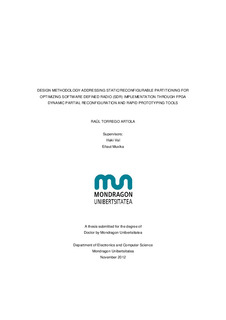| dc.rights.license | | * |
| dc.contributor.advisor | Muxika Olasagasti, Eñaut | |
| dc.contributor.advisor | Val, Iñaki | |
| dc.contributor.author | Torrego, Raul | |
| dc.date.accessioned | 2020-07-01T13:24:13Z | |
| dc.date.available | 2020-07-01T13:24:13Z | |
| dc.date.issued | 2012 | |
| dc.date.submitted | 2013-04-29 | |
| dc.identifier.other | https://katalogoa.mondragon.edu/janium-bin/janium_login_opac.pl?find&ficha_no=97328 | en |
| dc.identifier.uri | https://hdl.handle.net/20.500.11984/1710 | |
| dc.description.abstract | The characteristics people request for communication devices become more and more demanding every day. And not only in those aspects dealing with communication speed, but also in such different characteristics as different communication standards compatibility, battery life, device size or price. Moreover, when this communication need is addressed by the industrial world, new characteristics such as reliability, robustness or time-to-market appear. In this context, Software Defined Radios (SDR) and evolutions such as Cognitive Radios or Intelligent Radios seem to be the technological answer that will satisfy all these requirements in a short and mid-term.
Consequently, this PhD dissertation deals with the implementation of this type of communication system. Taking into account that there is no limitation neither in the implementation architecture nor in the target device, a novel framework for SDR implementation is proposed. This framework is made up of FPGAs, using dynamic partial reconfiguration, as target device and rapid prototyping tools as designing tool. Despite the benefits that this framework generates, there are also certain drawbacks that need to be analyzed and minimized to the extent possible. On this purpose, a SDR design methodology has been designed and tested. This methodology addresses the static/reconfigurable partitioning of the SDRs in order to optimize their implementation in the aforementioned framework.
In order to verify the feasibility of both the design framework and the design methodology, several implementations have been carried out making use of them. A multi-standard modulator implementing WiFi, WiMAX and UMTS, a small-form-factor cognitive video transmission system and the implementation of several data coding functions over R3TOS, a hardware operating system developed by the University of Edinburgh, are these implementations. | en |
| dc.description.abstract | Las características que la gente exige a los dispositivos de comunicaciones son cada día más exigentes. Y no solo en los aspectos relacionados con la velocidad de comunicación, sino que también en diferentes características como la compatibilidad con diferentes estándares de comunicación, autonomía, tamaño o precio. Es más, cuando esta necesidad de comunicación se traslada al mundo industrial, aparecen nuevas características como fiabilidad, robustez o plazo de comercialización que también es necesario cubrir. En este contexto, las Radios Definidas por Software (SDR) y evoluciones como las Radios Cognitivas o Radios Inteligentes parecen la respuesta tecnológica que va a satisfacer estas necesidades a corto y medio plazo.
Por ello, esta tesis doctoral aborda la implementación de este tipo de sistemas de comunicaciones. Teniendo en cuenta que no existe una limitación, ni en la arquitectura de implementación, ni en el tipo de dispositivo a usar, se propone un nuevo entrono de diseño formado por las FPGAs, haciendo uso de la reconfiguración parcial dinámica, y por las herramientas de prototipado rápido. A pesar de que este entorno de diseño ofrece varios beneficios, también genera algunos inconvenientes que es necesario analizar y minimizar en la medida de lo posible. Con este objetivo, se ha diseñado y verificado una metodología de diseño de SDRs. Esta metodología se encarga del particionado estático/reconfigurable de las SDRs para optimizar su implementación sobre el entrono de diseño antes comentado.
Para verificar la viabilidad tanto del entorno, como de la metodología de diseño propuesta, se han realizado varias implementaciones que hacen uso de ambas cosas. Estas implementaciones son: un modulador multi-estándar que implementa WiFi, WiMAX y UMTS, un sistema cognitivo y compacto de transmisión de video y la implementación de varias funciones de codificación de datos sobre R3TOS, un sistema operativo hardware desarrollado por la Universidad de Edimburgo. | es |
| dc.language.iso | eng | en |
| dc.publisher | Mondragon Unibertsitatea. Goi Eskola Politeknikoa | en |
| dc.rights | © Raul Torrego Artola | en |
| dc.rights.uri | | * |
| dc.subject | Radiocomunicaciones | es |
| dc.subject | Diseño lógico | es |
| dc.subject | Dispositivos de transmisión de datos | es |
| dc.title | Design methodology addressing static/reconfigurable partitioning optimizing software defined radio (SDR) implementation through FPGA dynamic partial reconfiguration and rapid prototyping tools | en |
| dc.type | http://purl.org/coar/resource_type/c_db06 | |
| dcterms.accessRights | http://purl.org/coar/access_right/c_abf2 | en |
| local.contributor.group | Teoría de la señal y comunicaciones | es |
| local.description.responsability | Arslan, Tughrul (Presidente); Mendicute Errasti, Mikel (Secretario); Martinez Coca, Imanol (Vocal); Burg, Andreas (Vocal); Torre Arnanz, Eduardo (Vocal) | es |
| local.identifier.doi | https://doi.org/10.48764/nmzb-r265 | |
| oaire.format.mimetype | application/pdf | |
| oaire.file | $DSPACE\assetstore | |
| oaire.resourceType | http://purl.org/coar/resource_type/c_db06 | en |







